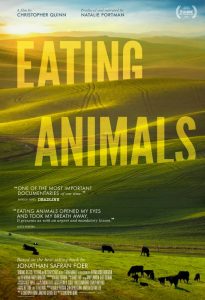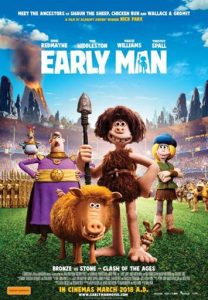It’s likely that even the staunchest vegan-hating carnivores don’t like watching footage of animals getting tortured. One suspects this is why many people have no interest in watching documentaries advocating for vegetarianism or veganism; they don’t want to make changes to their diet, and they sure as hell have no interest in being guilt-tripped into a change of mind.
Christopher Dillon Quinn’s Eating Animals contains a few grizzly scenes you’d rather not watch, but in general tries to win the crowd over with emotive human interest stories rather than torture porn. The 94-minute documentary film, narrated by the calm and familiar voice of Natalie Portman, seeks to persuade its audience with rational and balanced commentary about the meat industry’s practices and its history. This method makes it an accessible format for both those already convinced by vegetarian arguments and open-minded folk who enjoy a good documentary.
One of the key contentions of Eating Animals, based on the memoir by Jonathan Safran Foer, is that factory farms didn’t spring up overnight by an evil overlord but were rather the eventual outcome of a slow process of incremental changes to the farming ecosystem. Indeed, one of the film’s strengths is its ability to tell this story with reference to history, not making any assumptions about the audience’s prior knowledge or biases.
The antidote it offers is fittingly gradual, positing that incremental changes in the opposite direction offer hope for an alternative future. These changes include the rise of plant-based meat products, the increased public awareness of animal brutality, and the stories of individual farmers taking a stand for their methodology.
 Vegetarians and vegans opposed to the killing of animals will be less convinced by the arguments made in favour of traditional-style farming, where animals are cared for and given space to roam rather than being force-fed hormones and caged in inhumane conditions. But the interviews conducted with these farmers reveal a human-side of the issue that’s often overlooked. These interviews powerfully highlight the cruel, heartless economies of scale of factory farming, perhaps more than any gory scenes of animal mistreatment do.
Vegetarians and vegans opposed to the killing of animals will be less convinced by the arguments made in favour of traditional-style farming, where animals are cared for and given space to roam rather than being force-fed hormones and caged in inhumane conditions. But the interviews conducted with these farmers reveal a human-side of the issue that’s often overlooked. These interviews powerfully highlight the cruel, heartless economies of scale of factory farming, perhaps more than any gory scenes of animal mistreatment do.
The account of one farmer who is morally opposed to his own treatment of chickens yet has no economic alternatives is a bleak story, but one that reveals the true criminals in the system are not the working farmers but the broader systems that exist as the norm. Quinn’s decision to return to this man and his family at multiple points in his timeline is an inspired one, helping the audience connect with each interview subject.
The word ‘capitalism’ isn’t used much, but the film’s anti-capitalist roots are strong. The grim tales of helpless farmers – who activists might otherwise assume are the villains – force viewers to re-consider the true enemy of plant-based consumers. And while few big corporations are named and shamed, it doesn’t take much to read between the lines and work out who deserves the blame.
While Eating Animals is a documentary no doubt inspired by activism, it’s a film that doesn’t reduce itself to classical activist techniques. It may not be the most headline-grabbing film on animal agriculture, but it may be one of the more compelling and accessible ones.
Eating Animals will screen at selected cinemas from 20th November through Demand.Film. See here for dates and venues.





